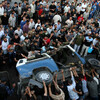
Solidarity in Shatila
Shatila refugee camp 26 May 2007
Coming into Shatila, I heard loudspeakers calling for donations for the displaced from the Nahr al-Bared camp. “Help us help the families hosting their relatives from Nahr al-Bared; any donations would be appreciated,” the person on the loudspeaker called out. I went to the site appointed for donations collection, and met a woman asking if clothes were among the needed items. “These are old clothes, like the ones we wear, I swear, I am not differentiating between my family and them. I wish I had money but this is all what I could find at home,” she said. Read more about Solidarity in Shatila








